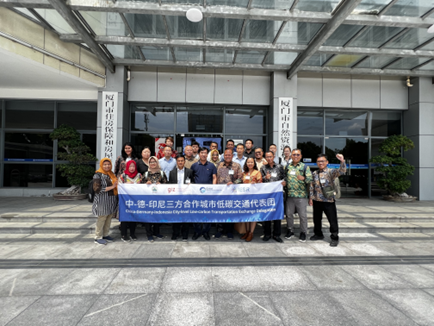GIZ successfully conducted its kick-off workshop of the Urban-Act Project China Component on 25 January 2024, in Beijing. Over 50 participants from the German Embassy in Beijing, GIZ East Asia, GIZ Urban-Act Thailand Component, GIZ Urban-Act Philippines Component, GIZ Urban-Act Indonesia Component, U.N. Economic and Social Commission for Asia and the Pacific (UN ESCAP), United Cities and Local Governments Asia-Pacific (UCLG ASPAC) and Chinese partners at national and city levels attended the event.

Photo Credit: GIZ
Chinese representatives included the Ministry of Natural Resources (MNR), Ministry of Ecology and Environment (MEE), National Center for Climate Change Strategy and International Cooperation (NCSC), Tongji University, Shanghai Urban Planning and Design Research Institute, Xi’an Urban Planning and Design Research Institute, China Land Surveying and Planning Institute, National Spatial Planning and Research Center, Jiaxing Natural Resources Bureau, Xiamen Natural Resources Bureau, Xiamen Land Space and Transportation Research Center, Department of Natural Resources of Shanxi Provincial, Department of Natural Resources of Hebei Provincial, and the Xiong’an New Area Management Committee Natural Resources and Planning Bureau.

Photo Credit: GIZ
In her opening remarks, Ms LI Feng, Deputy Director General in the Territorial and Spatial Planning Bureau of theMinistry of Natural Resources (MNR), one of the Urban Act Project’s political partners in China, emphasised that climate change is a global challenge requiring collective international efforts. She also underscored the importance of establishing a platform with international perspectives and Chinese characteristics. Such a platform would facilitate interdepartmental, multi-field, multidisciplinary, cross-regional, and even cross-national exchange. Moreover, the deputy director general highlighted the Ministry’s commitment to implementing the “double evaluation” of resource and environmental carrying capacity and the suitability of national spatial development. This includes practising the concept of low-carbon development and resilience in planning at all levels, as well as undertaking ecological restoration for improved carbon sink capacity of ecosystems. She highlighted the significance of the Urban-Act project in this regard.

Photo Credit: GIZ
Mr JIANG Zhaoli, First Counsel in the Department of Climate Change at the Ministry of Ecology and Environment (MEE), the other political partner of Urban Act China Component, reaffirmed China’s commitment to addressing climate change. He stressed China’s strategy of balancing mitigation and adaptation, with cities being a top priority for green and low-carbon development. China will continue to explore and deepen low-carbon pilot projects and develop climate-resilient cities for climate mitigation and adaptation.

Photo Credit: GIZ
Dr Matthias Diehl, Second Secretary of the Economic Cooperation & Development, Environmental Affairs Department of the Embassy of the Federal Republic of Germany Beijing, expressed his support for the project on behalf of the German government. He also emphasized the importance of global cooperation in addressing climate change and stressed the importance of more fruitful cooperation between China and Germany in this field.
The workshop involved extensive discussions regarding the attainment of low-carbon and resilient urban development, as well as the imperative of incorporating climate change considerations into urban spatial planning. Attendees concurred on the importance of fostering multi-level and cross-sectoral communication and coordination, both nationally and locally, to guarantee the successful execution of climate change strategies and initiatives within urban areas.
At the closing session, Ms HOU Fang, Deputy Director of the Division of the Department of Climate Change at MEE, and Mr KAO Yanming, Deputy Director of the Division at the Territorial and Spatial Planning Bureau of MNR, summarised the event’s outcomes and underscored the significance of the Urban-Act project in establishing an international cooperation platform for the exchange and implementation of low-carbon and resilient cities in China.

Photo Credit: GIZ
The launch of the Urban Act project China Component signifies a new phase in Sino-German cooperation in the field of sustainable urban development under the framework of climate change. In the implementation of future activities, the Urban-Act project will focus on strengthening key aspects, such as capacity development and knowledge sharing, as well as building an information sharing and exchange platform among the project’s country partners to further promote the success of this cooperation.
About Urban-Act
The Urban-Act project, commissioned by the Federal Ministry of Economic Affairs and Climate Action (BMWK) under the International Climate Initiative (IKI), is being implemented by GIZ in five countries in the Asia-Pacific region: China, India, Indonesia, the Philippines, and Thailand. Its overarching objective is to improve the enabling conditions for planning and implementing evidence-based and inclusive urban climate actions in these countries, aligning with the Sustainable Development Goals (SDGs) and Nationally Determined Contributions (NDCs) of the United Nations.
In China, GIZ is currently partnering with the the cities of Jiaxing, Xiamen, and Xi’an, collaborating with Shanghai Urban Planning and Design Research Institute (SUPDRI), Tongji University, and National Center for Climate Change Strategy and International Cooperation (NCSC) to implement the Urban-Act Project China Component. Throughout the project’s duration, GIZ anticipates further cooperation with additional cities and technical institutes. These include Shanghai, Xiong’an New Area in Hebei Province, as well as the Demonstration Zone for Integrated Ecological and Green Development in the Yangtze River Delta Region. Further technical partners include China Land Surveying and Planning Institute, and National Spatial Planning and Research Center. The project in China aims to promote the integration of climate change factors and indicators into existing urban territorial and spatial planning, establish a comprehensive spatial planning, monitoring, and evaluation system, and promote sustainable, low-carbon, and resilient urban development in the context of climate change.
(Author: Shen Lei)



